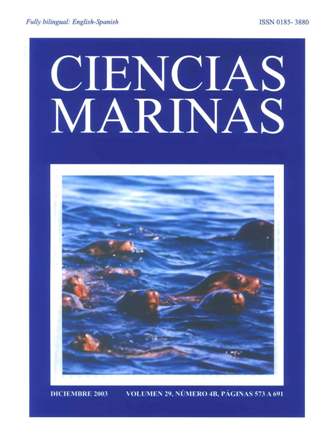Mytilus californianus transplanted as upwelling bioindicators to two areas off Baja California, Mexico
Main Article Content
Abstract
To study the spatial and temporal variability of bioavailable Cd, mussels (Mytilus californianus) were transplanted from a control zone to two upwelling areas off the northwestern coast of Baja California, Mexico. The mussels were placed at 5 and 15 m depth on buoy systems, at two sites selected for their different upwelling intensity. Punta Banda is characterized by intense upwelling events, with mean monthly temperatures of 13.00 ± 1.83ºC and abrupt drops in temperature to 9.7ºC, whereas upwelling off the Coronado Islands is less intense and mean monthly temperatures are 16.33 ± 2.15ºC, with abrupt drops in temperature to 11.0ºC. Mussel samples were collected regularly during upwelling (April to September) and non-upwelling periods (January to March). Mean Cd concentrations in soft tissue of transplanted mussels were higher at Punta Banda (17.23± 1.89 ∞g g|–1 dry weight) than at Coronado Islands (9.86 ± 1.37 ∞g g–1 dry weight). The analysis of correlation showed that the concentration of Cd in mussels from Punta Banda (r = 0.91) and Coronado Islands (r = 0.75) is related to the Bakun upwelling index. These results suggest that upwelling plays an important role in controlling Cd content in M. californianus from northwestern Baja California. Transplanted mussels proved to be excellent bioindicators of upwelling.
Downloads
Article Details
This is an open access article distributed under a Creative Commons Attribution 4.0 License, which allows you to share and adapt the work, as long as you give appropriate credit to the original author(s) and the source, provide a link to the Creative Commons license, and indicate if changes were made. Figures, tables and other elements in the article are included in the article’s CC BY 4.0 license, unless otherwise indicated. The journal title is protected by copyrights and not subject to this license. Full license deed can be viewed here.

